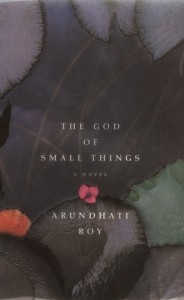Arundhati Roy’s The God of Small Things
Intimate relationships shaped by the movement of history
After I received my graduate degree in creative writing, I flew to Dar es Salaam, where my father, who worked for the Canadian High Commission, had offered me the use of his spare room. In my suitcase, I packed a handful of novels, together with a few things my father couldn’t buy in Tanzania—good cheese, whipped honey, a particular brand of mouthwash. I’d read the novels already but brought them along, thinking they might be instructive as I considered writing something of my own.
Re-reading Arundhati Roy’s The God of Small Things, I was delighted to discover that she broke many of the rules I’d learned in grad school. And she’d broken them beautifully. In my own writing, I feared purple prose and overwrought sentences, and embraced an esthetic of minimalism. In a simple, direct sentence, there were few opportunities for mistakes.
But Roy takes risks with her prose; it’s playful and sumptuous. She uses adjectives and invents her own compound words: furrywhirring, sariflapping. She captures the charms of spoken language, the diction of children and English-influenced Malayalam. She rhymes words in her narration: “Thirty-one. Not old. Not young. But a viable-dieable age.” A sentence fragment can comprise a whole paragraph: “Satin lined.”
A classmate wrote to me, “[The God of Small Things] does things with language I wouldn’t be brave enough to do. I’ll read it to feel bad about myself. I’ll read it to feel good about everything else.”
Another prejudice I’d internalized during my school years was that domestic narratives were somehow lesser. An editor I knew said he was tired of reading women who wrote about families. He wanted stories about war and politics: the world, not the home.
In Roy’s book, the most intimate relationships—lovers, twins, family—are shaped by the movement of history. She illuminates how colonialism and class hierarchy motivate and limit the possibilities of her characters’ lives. The half-English, half-Indian cousin, Sophie Mol, enjoys special status, but is innocent of the dangers of India. Ammu’s love for an untouchable man proves impossible.
War and politics are domestic narratives. The home is the world.


